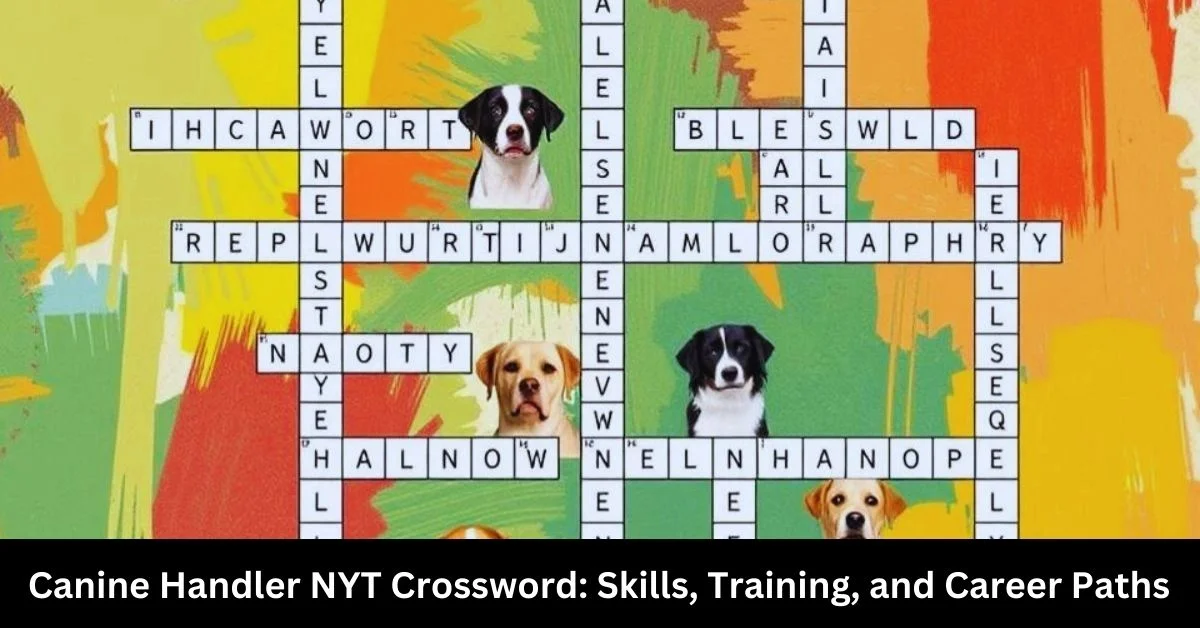Canine handlers play a crucial role in various sectors, working closely with dogs to assist in law enforcement, military operations, search and rescue missions, and even therapeutic services. A profession that requires immense patience, dedication, and skill, canine handlers ensure the effectiveness and well-being of their canine partners. This article explores the responsibilities, skills, and importance of canine handlers, alongside an examination of how they are referenced in popular culture, including the world of crosswords, such as the New York Times Crossword. Using canine handler nyt crossword as an anchor point, we will delve into the broad scope of the profession.
What Is a Canine Handler?
A canine handler is an individual specially trained to work alongside a dog in professional settings. These dogs are often trained for specific tasks, ranging from detecting illegal substances, tracking missing persons, to providing companionship for people with disabilities. Canine handlers are responsible for the daily care, training, and deployment of these animals, ensuring they can perform their duties effectively.
Different Types of Canine Handlers
- Law Enforcement Canine Handlers: These handlers work with police dogs (K-9s) trained to assist in tracking criminals, detecting narcotics, explosives, and weapons, and even locating missing persons. The bond between a K-9 and its handler is strong, with many handlers often working with the same dog for years.
- Military Canine Handlers: Military dogs are trained for specialised roles such as detecting bombs, working in combat zones, or providing security. Handlers in this field undergo rigorous training alongside their dogs to prepare for extreme environments.
- Search and Rescue Canine Handlers: Search and rescue dogs are vital during natural disasters, accidents, or emergencies. Their superior sense of smell and ability to navigate difficult terrain make them invaluable for finding people who may be trapped or missing.
- Therapy and Service Dog Handlers: These handlers work with dogs trained to assist individuals with disabilities or those needing emotional support. The handler may be the person who needs assistance or someone working in a healthcare facility, helping dogs interact with patients.
- Customs and Border Protection (CBP) Handlers: CBP handlers work with dogs trained to detect contraband such as drugs, currency, and agricultural items. They play a significant role in border security, ensuring that illegal substances and other prohibited items do not enter the country.
The Skills Required to Be a Canine Handler
Being a canine handler is not just about having a love for dogs. It requires specific skills, both in handling the dogs and working within their specialised fields.
Physical Fitness
Canine handler nyt crossword often work in demanding environments that require them to be physically fit. Whether they are tracking down suspects, conducting searches in hazardous areas, or managing dogs in high-stress situations, handlers need to maintain their strength and stamina.
Strong Communication
While communication between a handler and a dog might seem one-sided, handlers must be adept at interpreting a dog’s behaviour and signals. Dogs communicate through body language, barking, and other cues, and handlers must be able to understand these signals and respond appropriately.
Patience and Persistence
Training a dog to perform specialised tasks can take months or even years. Handlers need to be patient, persistent, and consistent with their training to ensure the dog performs to its full potential.
Problem-Solving Skills
Whether dealing with an uncooperative dog, changing environments, or unpredictable situations, handlers must be quick thinkers and problem solvers. They need to adjust their training or strategies based on the scenario to ensure both their safety and that of their canine partners.
Emotional Resilience
Canine handlers often work in emotionally taxing environments, such as disaster zones or crime scenes. They must be able to manage their emotional responses while ensuring that their dogs remain focused and effective.
Also Read: Amanda Labollita Anonib MAS: Online Privacy Concerns
The Bond Between Handler and Dog
One of the most fascinating aspects of being a canine handler is the bond that forms between the handler and their dog. This bond is built on trust, mutual respect, and communication. A strong bond ensures the dog’s obedience and responsiveness in high-stress situations. Handlers often spend more time with their dogs than anyone else, both at work and at home, further strengthening this connection.
In many cases, the handler becomes the dog’s primary caregiver, responsible for feeding, grooming, and maintaining the dog’s health. This level of care is essential, as a healthy and well-cared-for dog will perform its duties more effectively.
Retirement of a Service Dog
When a service dog reaches the end of its working life, it often retires and may live with its handler as a pet. The emotional connection formed over years of working together makes it common for handlers to adopt their dogs once they retire, allowing the bond to continue into the dog’s later years.
Training for Canine Handlers
Becoming a canine handler involves extensive training, both for the handler and the dog. The training process varies depending on the field in which the handler will work but generally includes a combination of classroom learning and hands-on experience.
Basic Handler Training
All canine handlers must undergo basic training, which covers animal behavior, communication, first aid for dogs, and basic obedience training. Handlers learn how to care for their dogs, manage their health, and ensure they are physically and mentally prepared for their tasks.
Field-Specific Training
In addition to basic training, handlers must undergo field-specific training tailored to their work environment. For example, a police dog handler will receive training in tracking, narcotics detection, and suspect apprehension, while a therapy dog handler will be trained in how to guide a dog in interacting with people in healthcare settings.
Ongoing Training
Canine handling is a lifelong learning process. Both the handler and the dog must continually update their skills and training to stay effective. Regular refresher courses, practice drills, and certifications are part of a handler’s ongoing professional development.
Popular Culture and Media: Canine Handlers in the NYT Crossword
The job of a canine handler is not only crucial in real life but has also found its place in popular culture. One interesting example is the appearance of canine handlers in crossword puzzles, such as the well-known New York Times (NYT) Crossword. The canine handler nyt crossword clue can lead to answers that highlight this fascinating profession, shining a light on the importance and variety of canine handler roles.
Crosswords often celebrate professions that involve partnerships between humans and animals, particularly dogs. This inclusion reflects society’s acknowledgment of the essential roles that canine handlers play in various fields, from law enforcement to healthcare. These crossword appearances also challenge solvers to think about the intricate details of the profession.
Also Read: The Power of Online Anonymity: Amanda Labollita Mas Anonib
The Challenges Canine Handlers Face
Despite the rewarding nature of the job, canine handlers face numerous challenges.
Emotional and Physical Toll
Handling working dogs, especially in stressful situations like search and rescue missions or criminal apprehension, can take a toll on both the handler’s physical and emotional well-being. The physical strain of long hours, exposure to hazardous conditions, and the responsibility for their canine partner’s life can be overwhelming.
High Costs of Training and Maintenance
Training a working dog is not cheap. For police departments, military units, or independent handlers, the cost of training a dog to perform specialised tasks can range from thousands to tens of thousands of dollars. Additionally, maintaining the dog’s health and well-being comes with its own set of financial challenges.
Time Commitment
Canine handlers often dedicate much of their personal time to caring for and training their dogs. The profession demands not only a commitment during working hours but also significant time outside of work for bonding and ongoing training. Handlers are usually responsible for their dogs 24/7, making this more than just a job – it’s a lifestyle.
The Rewards of Being a Canine Handler
While the job is demanding, the rewards of being a canine handler are immense.
Helping Others
For many handlers, one of the greatest rewards is the knowledge that they are making a real difference. Whether they are finding a missing person, apprehending a dangerous suspect, or providing comfort to someone in need, handlers and their dogs are often lifesavers.
Unique Partnership
The bond between a handler and their dog is unlike any other. Canine handlers often speak of the trust, loyalty, and companionship they experience in their relationships with their dogs. This partnership, built on communication and respect, is central to the handler’s success.
Opportunities for Growth and Advancement
In fields like law enforcement, military, and search and rescue, being a canine handler can open doors for career advancement. Many handlers go on to specialise further, become trainers, or move into leadership roles within their organisations.
Conclusion
The profession of a canine handler is one of dedication, skill, and emotional resilience. From law enforcement and military service to search and rescue operations, canine handlers perform critical duties alongside their highly trained canine partners. The relationship between the handler and the dog is built on trust and respect, forming a powerful team capable of performing life-saving tasks.
In popular culture, including clues like the canine handler nyt crossword, we see glimpses of the respect and fascination that the general public holds for these professionals. Their work is not only essential but also inspiring, reminding us of the profound bond between humans and animals. As the need for working dogs continues to grow, the role of the canine handler will remain indispensable across many sectors, ensuring safety, comfort, and companionship in countless lives.
Read More: Monetize Your Content with WWW FameBlogsNet






